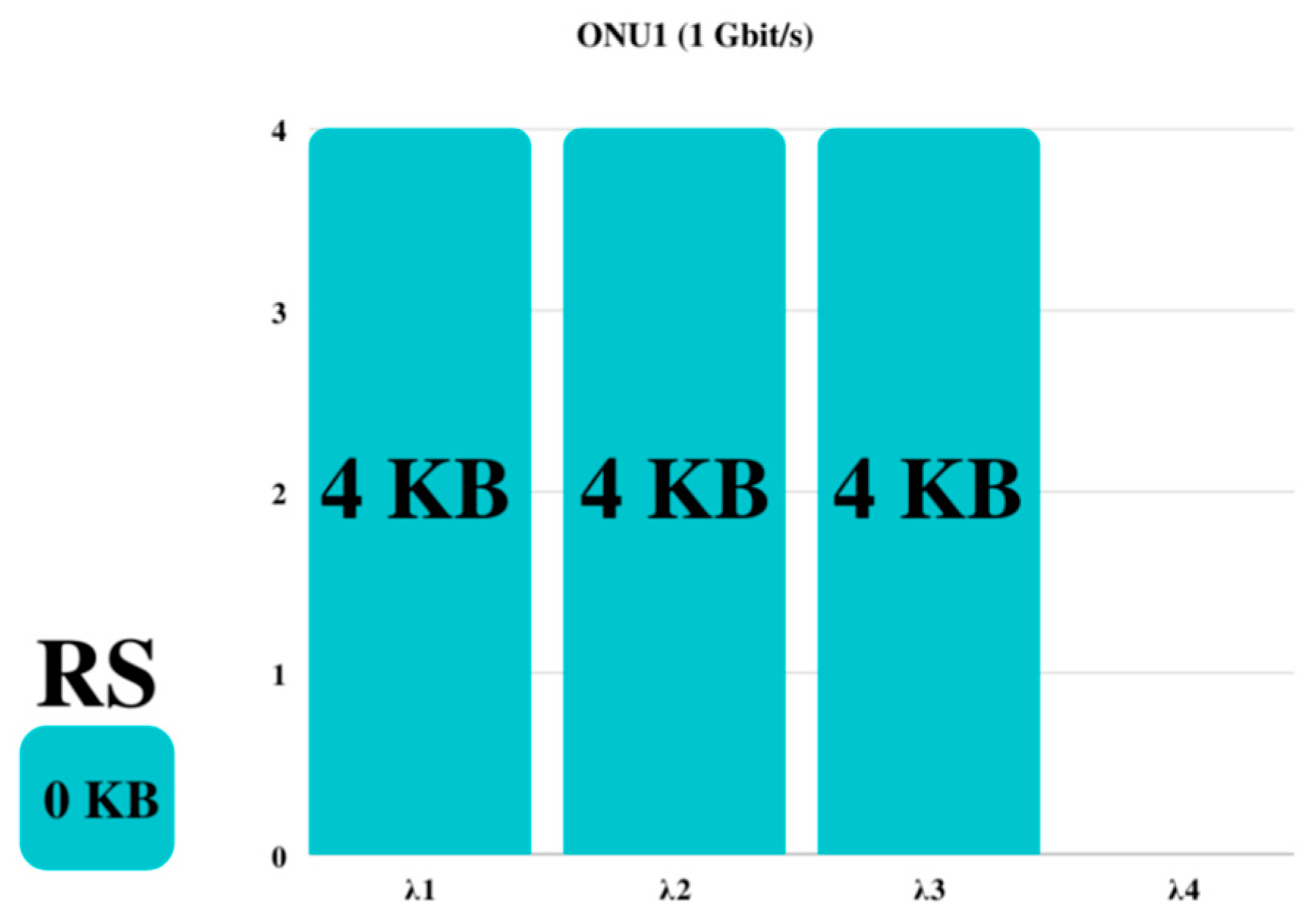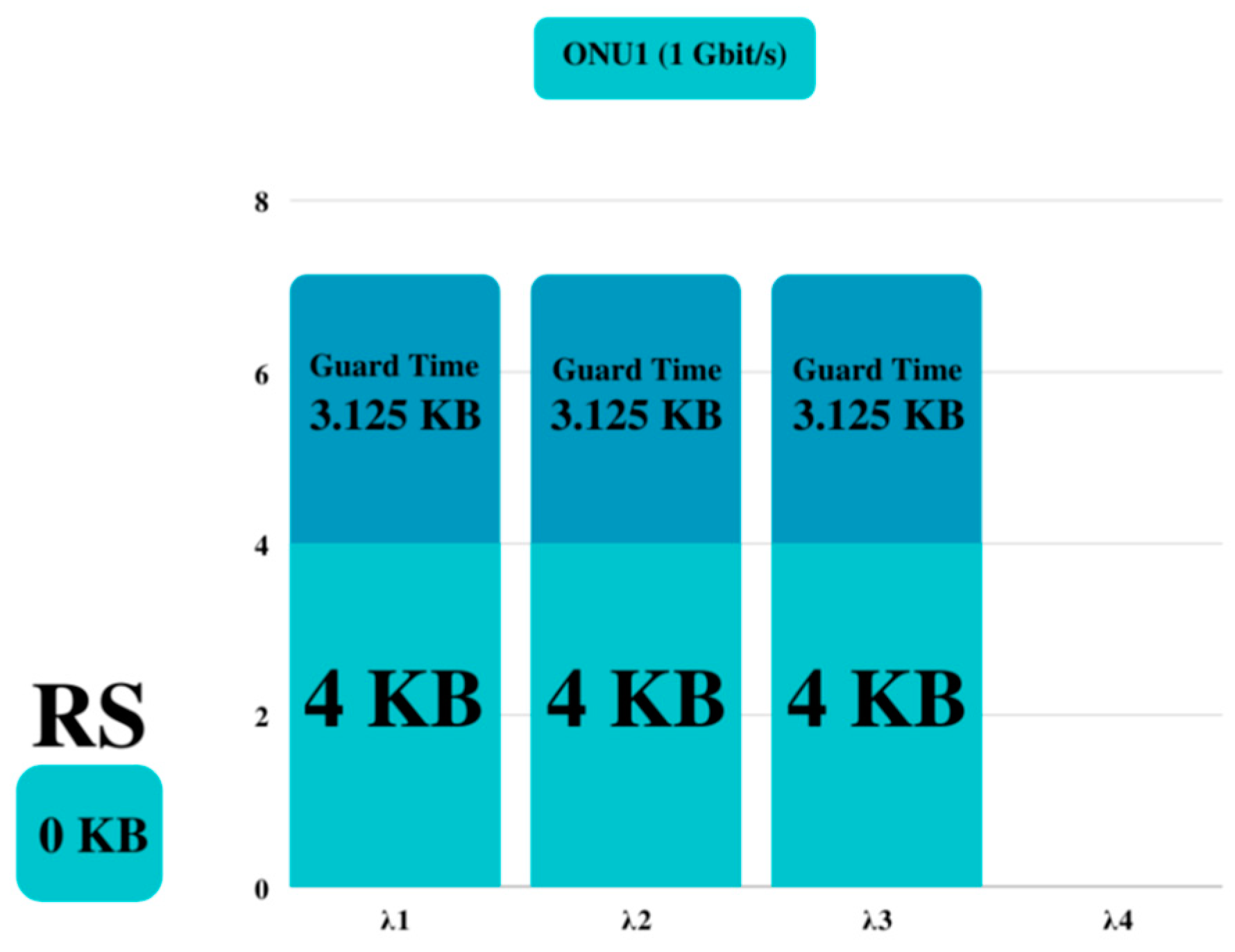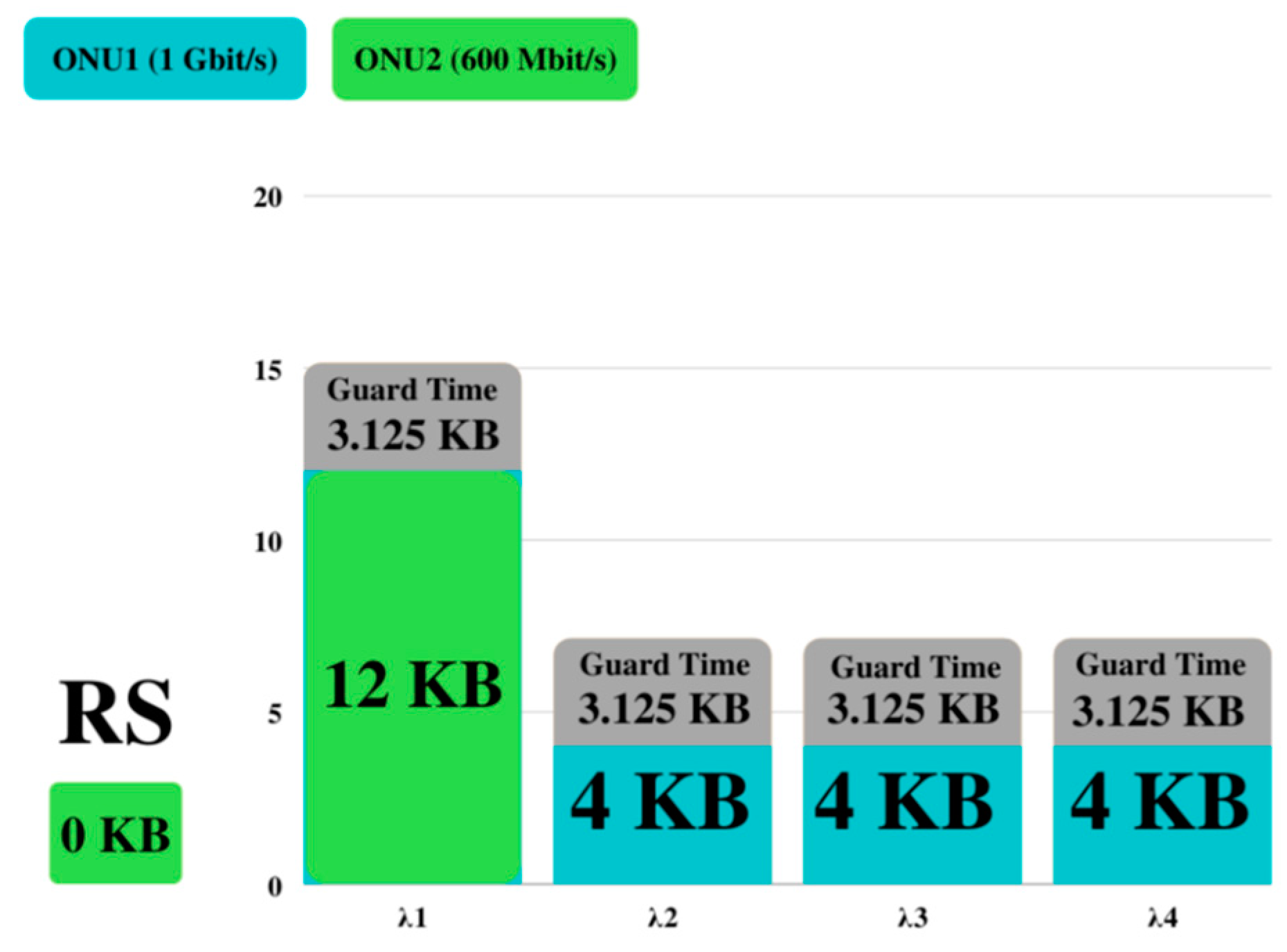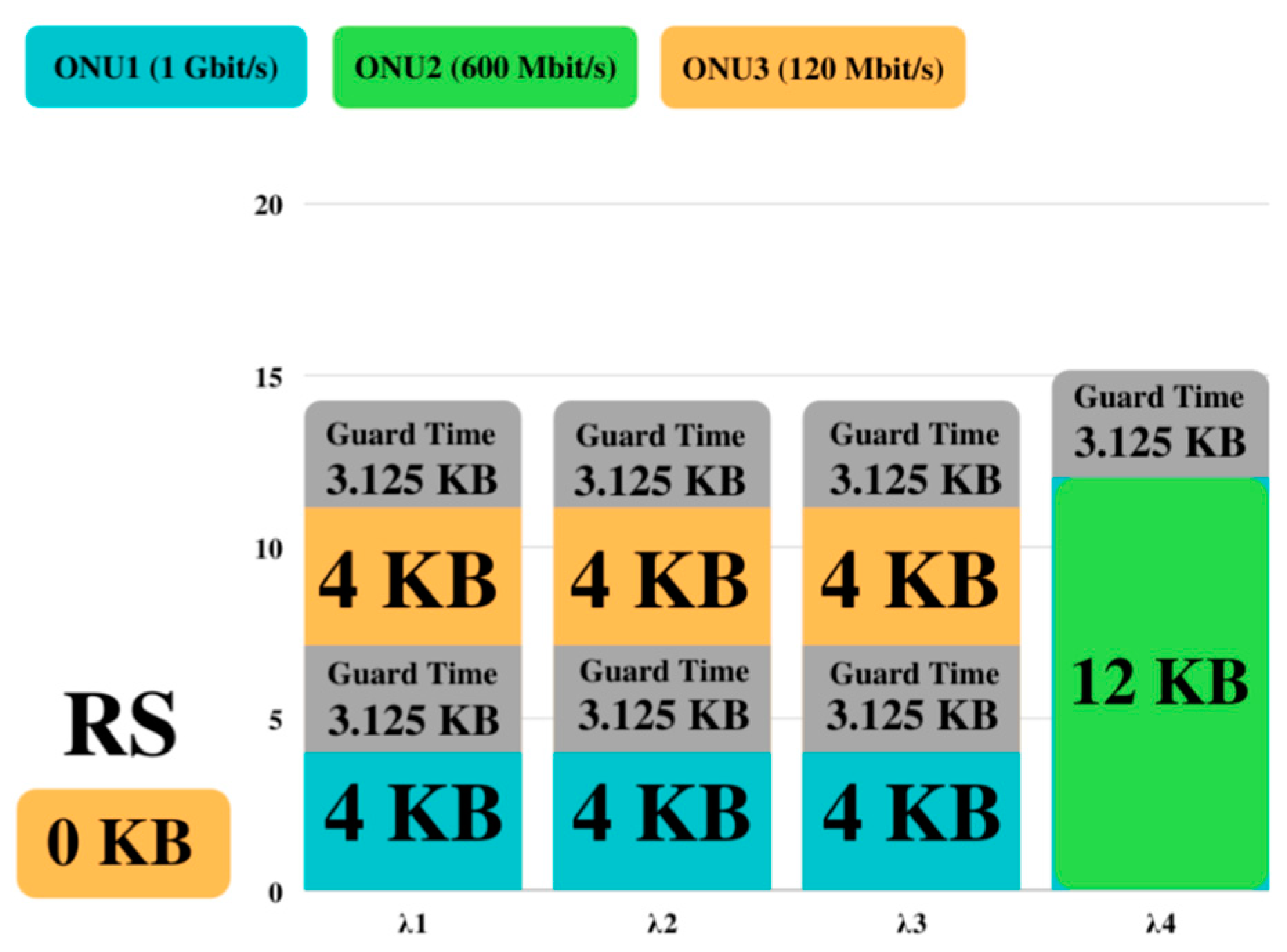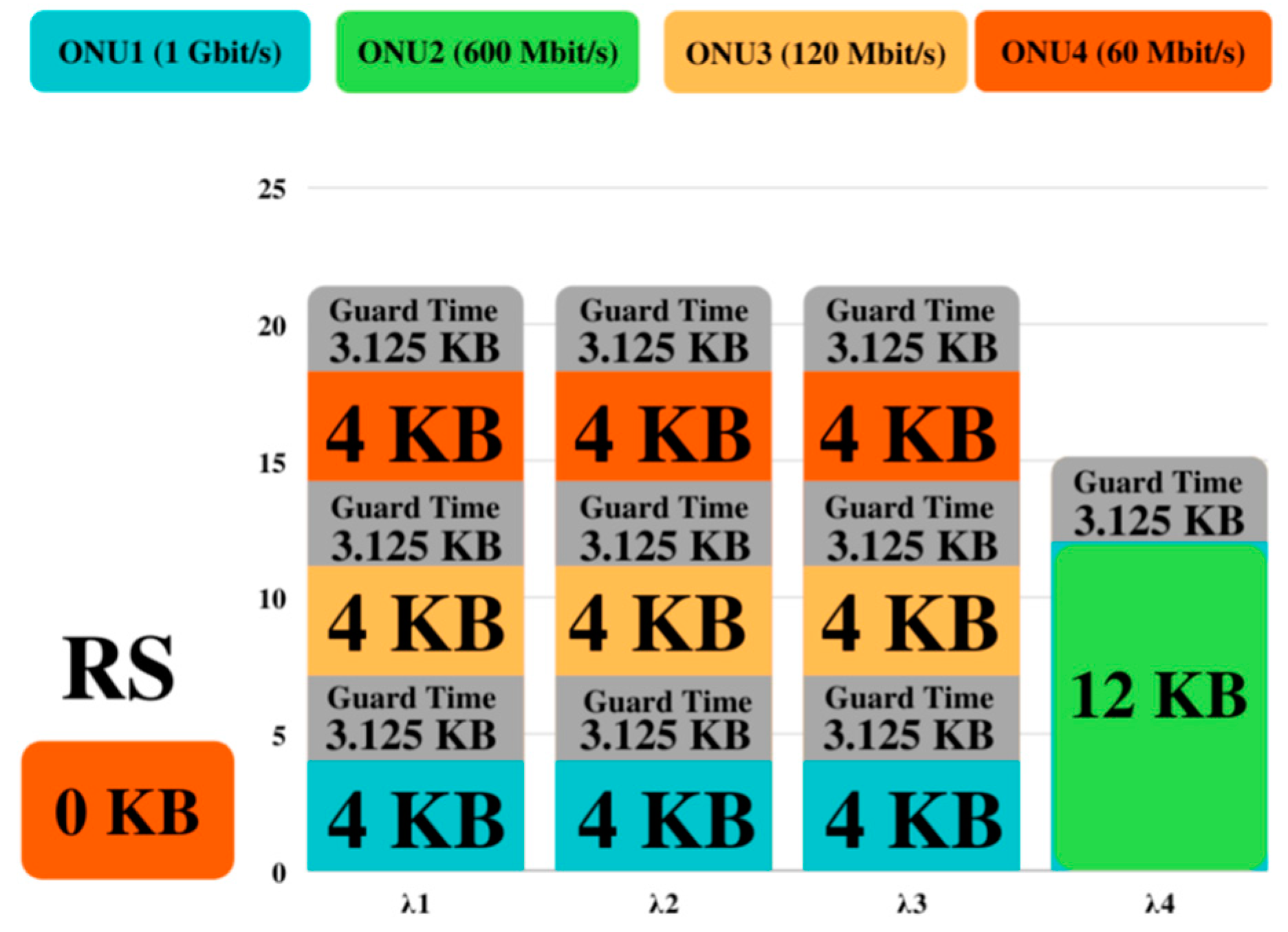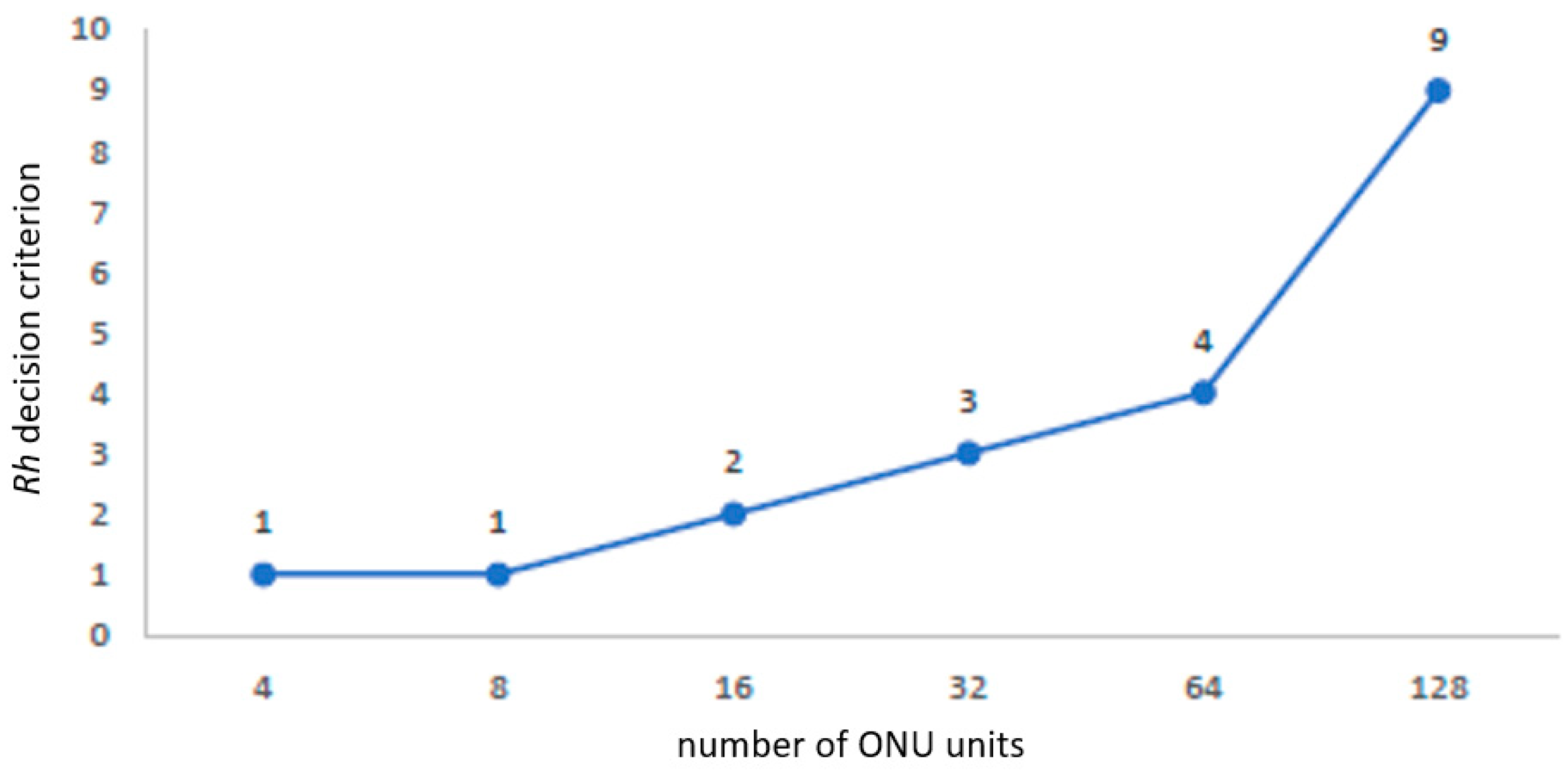1. Introduction
Demands for high-speed data services and bandwidth applications in business and residual customers are continuously rising every day. Due to coverage potential, cost-efficiency and a high transmission capacity, passive optical technologies are becoming a suitable access network option. Future access technologies utilized in passive optical networks must be able to provide high sustainable bandwidths on a per-user basis while keeping capital and operational expenditures as low as possible. Therefore, a deployment of the Dense Wavelength Division Multiplexing (DWDM) technique is becoming a reality in future Passive Optical Networks (PON) with its extensive operation in a short time [
1,
2]. So, the research is focused on the DWDM technique and its effective utilization in real passive optical systems and networks.
To achieve a maximum bandwidth and wavelength utilization, it is requested to have efficient Dynamic Bandwidth and Wavelength Allocation (DBWA) methods in the Wavelength Division Multiplexing-based Passive Optical Network (WDM-PON) system that is incorporated into the F5G architecture. Thanks to a wavelength depending technology, we can efficiently utilize the optical transmission medium, which is very important from the viewpoint of growing bandwidth demands and cheap services. In the present day, there are different standardized passive optical technologies with various dedicated wavelengths able to cooperate. Moreover, the availability of various wavelength transmission channels leads to the extension of advanced network traffic protection schemes. Therefore, new wavelength allocation methods must be considered in addition to effective bandwidth capacity utilization in current and near future hybrid Time- and Wavelength- Division Multiplexing-based Passive Optical Network (TWDM-PON) [
3,
4,
5,
6,
7,
8]. Next-Generation Passive Optical Networks (NG-PON) [
9] need among other things to provide also survivability schemes [
10,
11] in a cost-efficient way, whereas the growing importance of uninterrupted internet access makes fault management an important challenge [
12]. Reliability requirements may depend on user profiles. Thus, NG-PON networks should also support the end-to-end protection for selected users when requested [
13]. Within this context, it is significant to discover an effective way to analyze network traffic protection schemes for utilization in future passive optical networks as a part of the F5G architecture [
14,
15].
The recent standard for NG-PON2 networks [
16] describes only the single wavelength and bandwidth allocation and leaves the multiple wavelength allocation issue to preferences of network operators. So, effective bandwidth and wavelength allocation algorithms considered for WDM-PON networks present current research challenges of high interest. Given the dynamic nature of data traffic in passive optical networks, it is important to answer the question of how the Medium Access Control (MAC) layer supporting these wavelength channels reacts. The MAC implementation in NG-PON2 networks must take into consideration the intricacies involved in the Optical Line Terminal (OLT) design for any perspective technology to be able support the dynamic superset of Optical Network Unit (ONU) channels. In the passive optical network based on the WDM technique, a data traffic from multiple ONU units is multiplexed on available wavelength channels. Considering common demands of wavelength channels, this PON type requests available MAC protocols for coordination of communication between the OLT terminal and ONU units to avoid collisions in data transmission between various ONU units.
In [
17], the open problem of MAC implementation in NG-PON2 networks with multiple-line rate channels is showcased for the first time. A mechanism to provision bandwidth and guarantee a service framework in flexible wavelength spaced system is proposed. In contrast to the downstream traffic, the upstream traffic in the passive optical network based on the hybrid TDM and WDM technique needs an appropriate MAC protocol for avoiding data collisions between ONU units. In such case, the OLT terminal collects data from ONU units, makes decision regarding allocated bandwidths and manages the network. Subsequently, a multiple upstream version of the Interleaved Polling with Adaptive Cycle Time (IPACT) was designed. This algorithm expects that each ONU unit supports all possible allocated wavelengths. In a case that the allocated wavelength is not supported by the ONU, then the next available supported wavelength will be allocated.
2. Extended DWBA algorithms for implementation in NG-PON2 networks
In [
18], an overview on recent developments and progress on standardization in next-generation high-speed passive optical networks is given. An outline of the physical layer as well as MAC layer functions is discussed. The NG-PON2 network can work in a range of conjugated 100 Gbit/s data rates to provide higher data rates for subscribers. These data rates can be also achieved by multiplexing four wavelengths with the 25 Gbit/s transmission capacity for each. In such network, the ONU unit needs to be colorless unit equipped with four fixed wavelength transmitters and must provide a possibility for data transmitting on various wavelengths in the same time depending on the adjusted planning strategy of service network providers. In [
19], a novel PON-based architecture is proposed for a mobile backhaul to enhance connectivity between the neighboring base stations. A tailored MAC protocol and DBA algorithm are introduced to support fast communications inter base stations.
In the NG-PON2 network, a OLT terminal allocates bandwidth to ONU units by means of the GRANT control messages in the
RR (Round Robin) way. In each GRANT message, the OLT terminal determines
TW (Transmission Window) periods on each from four wavelengths assigned to the ONU unit. This resource allocation is determined using a dynamic bandwidth allocation method realized in the OLT terminal. In a moment of receiving the GRANT message, the ONU unit right away transmits its frames to the OLT terminal. After data transmitting, the ONU unit transmits the REPORT gate for reporting its status of the buffer storage to the OLT. For avoiding data overlapping, the
GT (Guard Time) time is designated to each wavelength for separation of data transmitting from various ONU units each other. For the 25 Gbit/s data rate, the
GT parameter is considering 1 μs, that presents 3,125 KB in the data space [
19].
For assigning a flexible number of wavelengths to the ONU unit in the NG-PON2 network, it is requested an effective dynamic bandwidth and wavelength allocation. If the algorithm of dynamic bandwidth and wavelength allocation is not sufficiently effective, a number of wavelengths and also a size of the transmission window on each wavelength can be inappropriately assigned. So, an inadequate transmission capacity of wavelengths can be assigned to ONU units with higher traffic loading. In this case, a delay of packets from the ONU unit will be increased. In another case, more wavelengths can be assigned to ONU units with low traffic loading. Subsequently, the
GT data space is close to or larger than the
TW size on each wavelength. As a result, a wasteful usage of the upstream bandwidth can be arose influencing the network performance by increasing the delay [
18,
19].
Therefore, effective dynamic bandwidth and wavelength allocation algorithms considered for NG-PON2 networks are in the center of research interests. In [
18], two different DWBA algorithms are proposed for the NG-EPON. DWBA-I is a QoS-based algorithm that has been designed to manage different types of data traffic in NG-EPON networks and performs better than different existing DBA algorithms in terms of packet delay, competition time and packet drop ratio. DWBA-II meets the system requirements and specifications of NG-EPON networks, handles traffic requirements of subscribers in a cost effective manner and is better than First-Fit DWBA and Modified-IPACT algorithms on the basis of average delay, grant utilization, completion time and packet drop ratio. Both proposed algorithms are not oriented on increasing the bandwidth utilization. In [
21], five different DWBA schemes are proposed with diverse customers and prioritized traffic for NG-PON2 systems. Mixed integer linear programming models are developed to minimize a total delay of the high-priority data and heuristics algorithms are developed based on these models. Proposed schemes with priority class consideration show significant improvement in the total delay of the high-priority data as those are sent first. All the schemes either use single or all wavelengths. The proposed algorithm does not take into consideration that there can be an optimal number of wavelengths to allocate and a bandwidth utilization to increase.
On the effective bandwidth utilization of the transmission capacity related to dedicated wavelengths, following algorithms are oriented. The first FFA (First Fit Algorithm) DBA method is characterized that each wavelength in the NG-PON2 network has dedicated the index from 1 up to
W, where
W is a number of all wavelengths supported by the optical fiber. This algorithm is looking for free wavelengths in the fixed order. The first available wavelength is selected and no correlation between a spectrum localization and a dedicated index order is needed. An index order can be used for potential improving of the network performance. Actually used wavelengths are ordered with lower indexes and thus wavelengths with higher indexes can be available for longer transmission paths with higher probability [
17].
The First Fit Algorithm is fast and can be utilized in both centralized and distributed network operations. This algorithm has an adequately low blocking and fairness probability, low overhead processing and low complexity. A problem is arising in a situation that created connections are later cancelled and an index order can’t guarantee a real wavelength allocation. The FFA index strategy is perceived just as short-term and it loses its advantages with increasing changes in the network. This algorithm ever assigns only one wavelength to each ONU unit in each allocation cycle. Primarily a wavelength that has the earlies starting time will be selected for the upstream transmission. It solves a problem of the delay in order that comes into existence by transmitting data frames on multiple wavelengths in various times and orders. However, the First Fit DBA algorithm can’t accommodate to traffic loading variations of different ONU units or to changes of active ONU units.
The second WFA (Water-Filling Algorithm) DBA method is based on the Water-Filling approach. In contrast to the FFA, the WFA algorithm is trying to balance a utilization of wavelength in each bandwidth allocation. The Water-Filling Algorithm always begins with the earliest starting time for decreasing a difference of starting times for all wavelengths. It means that the FFA algorithm can best work with a high number of ONU units and the WFA algorithm has a best performance for a small number of ONU units in the NG-PON2 network. Because both algorithms can’t adaptively assign bandwidths on available wavelength according to varying reported traffic loading messages from ONU units ONU [
17], a key reason for looking for novel effective DBA algorithms is appearing.
The Effective Dynamic Bandwidth Algorithm (Effective Dynamic Bandwidth Allocation) works with the aim of wavelength allocation according to the traffic loading of ONU units. If the ONU traffic loading is higher than the next wavelength will be assigned by the way that a transmission window on each wavelength is larger than the
GT data space in this case. In another case, less wavelengths can be allocated for ONU units with reduced traffic loading. By this way, a number of allocated wavelength for each ONU unit can be varied in different cycles depending on reported bandwidth requests and assigned transmission window utilization. If a number of ONU units is low, so a maximum upstream bandwidth for one ONU unit can be high-large. In this case, the effective EDBA algorithm is trying to allocate more wavelength to ONU units. If a number of ONU units is high than each ONU unit can contribute little to the network traffic loading. In this case, the effective EDBA algorithm can allocate less wavelength to ONU units based on effective utilization of assigned transmission windows. By this way, the effective EDBA algorithm guarantees a sufficient bandwidth to each ONU unit and avoids a waste bandwidth spending caused by redundant GT guard times [
18,
19].
The EDBA algorithm can adaptively determine a bandwidth and wavelength allocation for each ONU unit based on the starting cycle time on each free wavelength and on the efficiency of grant utilization on concrete assigned wavelength. The effective EDBA algorithm arranges wavelengths in the ascending order based on their starting time and begins to allocate a bandwidth to a wavelength with earliest starting cycle time. Next wavelength will be assigned if the transmitting
TW size is larger than a difference
dif(i) with the starting cycle time of adjacent wavelength and simultaneously the
TW size is larger comparing to the
Rh decision criterion and the
GT data space, where the
Rh decision criterion je a real number used for defining a grant utilization efficiency [
18,
19].
The EDBA algorithm will be compared with two DBA methods designed for the NG-PON2 network with different purposes. For achieving better bandwidth utilization of dedicated wavelengths, this work is focused on the effective dynamic bandwidth allocation algorithm with adaptive allocation of wavelengths to ONU units and on the optimization of the decision criterion that is used for defining a minimum bandwidth utilization of the actual wavelength necessary for possible allocating next wavelength.
The NG-PON2 network [
16] has an architecture capable for the 40 Gbit/s total network capacity corresponding to four 10 Gbit/s symmetric downstream/upstream data rates available on each wavelength. The NG-PON2 architecture contains simultaneously both time- and wavelength- division multiplexing (TWDM) in downstream and upstream directions. For the downstream transmission, four fixed lasers are utilized in the OLT terminal with a wavelength multiplexer. Subsequently, a common light beam is filtered in each ONU unit with active tunable filters that allow out a required wavelength for its own receiver. For the upstream transmission, tunable lasers in each ONU unit dynamically assigns expected wavelengths. By this way, a utilization of active filters and tunable lasers in the ONU unit is unique. The upstream 1524-1544 nm and the downstream 1596-1602 nm wavelength bands are considered for the NG-PON2 system that can provide the 38 dB power budget and can support the 20 km transmission distance with the 1:512 splitting ratio.
For increasing bandwidth utilization of dedicated wavelengths, the main aim of our research work is oriented on the optimization of the decision criterion that defines a minimum bandwidth utilization of the actual wavelength necessary for possible allocating next wavelength. The Rh decision criterion is optimized for various numbers of ONU units incorporated into the NG-PON2 network.
In this paper, an attention is focused on the effective bandwidth and wavelength utilization in future next-generation passive optical networks. In the section 2, principles of dynamic wavelength and bandwidth algorithms in NG-PON2 networks are presented and reasons for investigating and implementing extended dynamic wavelength and bandwidth algorithms in these networks are analyzed. In the section 3, principles of the EDBA algorithm are introduced in details and the importance of the decision criterion optimization is emphasized. For analyzing novel extended DWBA algorithms utilizing for various wavelength allocation cases possible in NG-PON2 networks, a simulation program with the enhancement of the effective DBA algorithm is realized and an optimization of the decision criterion available for future passive optical networks based on the WDM technique is executed in the section 4. In section 5, a conclusion with future challenges and research directions are presented.
3. The EDBA algorithm principles
The EDBA algorithm works with the dynamic traffic loading of ONU units. When a reported traffic from ONU units is high, a corresponding size of the transmission window is also large. In this case, this
TW size is larger than the allocated overhead
GT data space. The EDBA algorithm is trying to divide a ONU traffic to various wavelengths based on their starting times and utilization of the bandwidth allocation. Larger
TW sizes assigned on each wavelength can avoid large transmission delays. In such case, the EDBA algorithm allocates transmission windows on all wavelengths, because the
TW size on each wavelength is larger than the
GT data space. Then, a performance of this algorithm is the same as the Water-Filling Algorithm [
18,
19].
When a reported traffic from ONU units is low, the EDBA algorithm is trying to allocate bandwidth requests on smaller number of wavelengths based on the bandwidth allocation utilization. The bandwidth allocation process begins with a wavelength with the smallest starting time for decreasing the overhead size due to
GT times. If the reported bandwidth request is smaller than the
GT data space or less than a decision criterion of the bandwidth allocation utilization, then EDBA algorithm allocates a bandwidth on one wavelength irrespective of a difference in starting times of wavelengths. The, the EDBA algorithm behaves similarly as the First Fit algorithm. If the reported bandwidth is larger than the
GT data space or than a criterion of the bandwidth allocation utilization, next wavelength will be allocated. In such case, an allocation by using the EDBA algorithm can be carried on any wavelength from four available. Therefore, the EDBA algorithm allocates a required number of wavelengths to the ONU unit based on the allocation utilization [
18,
19].
In a moment of the granted allocation, its utilization
ξ is calculated from the
TW size for data transmitting and the
GT data space using a following formula
For increasing the bandwidth allocation utilization, the Rh decision criterion is a crucial parameter because it determines the efficiency of the bandwidth utilization for the dedicated wavelength.
Table 1.
Parameters of the EDBA algorithm.
Table 1.
Parameters of the EDBA algorithm.
| Basic parameter |
Symbol |
| a number of ONU units |
N |
| a number of actual wavelengths assigned to ONU units |
W |
| index of ONU units |
K |
| index of wavelengths |
i |
| starting cycle times |
SCi |
| a guard time interval |
GT |
| a requested bandwidth |
RqB |
| a residual bandwidth |
RsB |
| a transmission window size |
TW |
| a difference of starting cycle times |
dif(i) |
| finishing cycle times |
FCi |
The simulation model is prepared and realized in the MATLAB 2021a programming environment. A simulation is executed in the online scheduling cycle where the OLT terminal can allocate
i wavelengths from 1 to 4 to the ONU
K unit based on its reported requested bandwidth
RqB. It begins with starting cycle times
SC that are collected and ordered from the smallest to the highest. After ordering, a program calculates a difference of adjacent starting cycle times as follows
where i = 1, 2, 3, …. Next, a residual bandwidth
RsB of the ONU unit is calculated, whereby
RsB = RqB at the start of the allocation process. A number of wavelengths allocated to the ONU unit is equal to zero (
W = 0) at the start of the allocation process.
The
GT parameter is default to the 1 μs at the 25 Gbit/s transmission rate corresponding to the 3,125 KB data space value. Then, the iteration begins if a condition of the EDBA algorithm is satisfied
If the
TW size allocated to the next wavelength is
Rh-times larger than the
GT data space, than this concrete wavelength will be allocated (
Rh = 1 at the start of the allocation process). Else, a requested bandwidth will be divided among already allocated wavelengths. A next wavelength is added to the
W parameter and a number of utilized wavelengths is increased
If a next wavelength is necessary, then the remaining residual bandwidth
RsB is uniformly allocated to wavelengths. Consequently, it is divided by W + 1. Over the iteration, the residual bandwidth
RsB is decreasing according to the formula
Based on the residual bandwidth
RsB, a decision about allocating next wavelength is done according to the equation (3). After finishing the iteration, the
TW size on the allocated wavelength is calculated as follows
After determining
TW sizes on particular wavelengths, starting cycle times of wavelengths for a subsequent ONU unit with its reported bandwidth are calculated and separated by the
GT data space for collision avoiding at the scheduling of next ONU unit. The formula is used simultaneously for finishing cycle time
FC of the previous ONU unit and for starting cycle time of the next ONU unit:
For increasing bandwidth utilization of dedicated wavelengths, the Rh decision criterion must be optimized for various number of connected ONU units.
5. Conclusion
In this contribution, we present a deployment of next-generation passive optical networks with extensive wavelength utilization and management. For implementations in NG-PON2 networks, extended dynamic wavelength and bandwidth allocation algorithms are considered and in the center of research interests. We are focusing on the effective bandwidth utilization of the transmission capacity related to dedicated wavelengths. Based on our simulation results, we can declare that the efficiency of the bandwidth allocation process can be improved and is strongly depending on optimized Rh decision criterion.
The EDBA algorithm based on a wavelength allocation according to the data traffic requests of ONU units allows flexible and effective utilizing network transmission capacities. So, the Rh decision criterion applied in the novel effective DBA algorithm considered for the implementation in NG-PON2 networks is optimized in this paper. Therefore, our optimization of the decision criterion supports possible utilization of the extended dynamic wavelength and bandwidth allocation methods into future NG-PON2 networks. A value of the decision criterion affects a number of assigned wavelengths during the iteration for one ONU unit and allows provisioning a demanded efficiency of bandwidth allocation process. Results from the EDBA simulation program present that our optimized Rh decision criterion seems to be more effective for larger number of ONU units incorporated into the NG-PON2 networks.
In future works, we can expand a complex view over extended dynamic wavelength and bandwidth allocation algorithms for implementation in NG-PON2 networks in a variety of ways. In these networks, AWG elements into the RN equipment and/or active components in optical end-point terminals can be incorporated. Subsequently, the efficiency of the bandwidth allocation for dedicated wavelengths must be analyzed with more details for larger coverage of metropolitan and access areas, higher numbers of users and higher transmission capacities per user. Besides, the attention paid to possible selection of the wavelength channels related to a practical utilization in DWDM communication systems can bring other environmental effects, above all the FWM phenomenon that influence a total network performance in future broadband optical metropolitan an access networks [
22]. Also, the novel effective DBA algorithm due its effective network resource utilization can be extended and integrated into the just-in-time wavelength scheduling for providing higher level of the network wavelength management and control in the OLT terminal.


